deep与deeply, close与closely, high与highly等的用法区别
形容词和副词的用法

形容词及其用法形容词修饰名词,说明事物或人的性质或特征。
通常,可将形容词分成性质形容词和叙述形容词两类,其位置不一定都放在名词前面。
1)直接说明事物的性质或特征的形容词是性质形容词,它有级的变化,可以用程度副词修饰,在句中可作定语、表语和补语。
例如:hot 热的。
2)叙述形容词只能作表语,所以又称为表语形容词。
这类形容词没有级的变化,也不可用程度副词修饰。
大多数以a开头的形容词都属于这一类。
例如:afraid 害怕的。
(错)He is an ill man.(对)The man is ill.(错)She is an afraid girl.(对)The girl is afraid.这类词还有:well,unwell,ill,faint,afraid,alike,alive,alone,asleep,awake 等。
3)形容词作定语修饰名词时,要放在名词的前边。
但是如果形容词修饰以-thing为字尾的词语时,要放在这些词之后,例如:something nice以-ly结尾的形容词1)大部分形容词加-ly可构成副词。
但friendly,deadly,lovely,lonely,likely,lively,ugly,brotherly,仍为形容词。
改错:(错)She sang lovely.(错)He spoke to me very friendly.(对)Her singing was lovely.(对)He spoke to me in a very friendly way.2)有些以-ly 结尾既为形容词,也为副词。
daily,weekly,monthly,yearly,earlyThe Times is a daily paper.The Times is published daily.用形容词表示类别和整体1)某些形容词加上定冠词可以泛指一类人,与谓语动词的复数连接。
如:the dead,the living,the rich,the poor,the blind,the hungryThe poor are losing hope.2)有关国家和民族的形容词加上定冠词指这个民族的整体,与动词的复数连用。
high与highly等副词与副词加-ly

high与highly英语中,有些形容词变化出两个副词,即与形容词同形和形容词后加-ly.这两种副词的意思异同关系有三类:1)意思相似:如:quick—quickly2)意思相近:如:wide(宽地)—widely(广泛地)high(高地)—highly(高度地)deep(深地)—deeply(深深地)close(近地;紧;紧密)—closely(密切地;认真地;仔细地)一般来说,与形容词同形的副词解释具体的概念;形容词后加-ly的副词解释为抽象概念。
如:1.Open your mouth wide.English is widely used in the world.2.The kite flew high in the sky.Can you jump that high ? 你能跳那么高吗?They were highly praised.He is a highly skilled worker.他是一位高度熟练的技术工人。
The headmaster think highly of our work.校长高度评价了我们的工作。
词组:think highly/much/a great deal/well of sb/sth 对…评价很高/对…高度评价给大家推荐一个英语微信群-Empty Your Cup英语微信群是目前学习英语最有效的方法,群里都是说英语,没有半个中文,而且规则非常严格,是一个超级不错的英语学习环境,群里有好多英语超好的超牛逼的人,还有鬼佬和外国美眉。
其实坦白说,如果自己一个人学习英语太孤独,太寂寞,没有办法坚持,好几次都会半途而废。
只要你加入到那个群里以后,自己就会每天都能在群里坚持学,坚持不停地说和练,由于是付费群,群里的成员学习氛围非常强,每天的训练度都非常猛,本来很懒惰的你一下子就被感染了,不由自主地被带动起来参与操练,不好意思偷懒,别人的刻苦学习精神会不知不觉影响你,Empty Your Cup英语微信群(进群加喂新 601332975)可以彻底治好你的拖延症,里面学员都非常友好,总是给你不断的帮助和鼓励,让你在学英语的路上重新燃起了斗志,因为每天都在运用,你的英语口语就能得到了迅猛的提升,现在可以随便给一个话题,都能用英文滔滔不绝的发表5分钟以上对这个话题的看法和观点,想提高英语口语的 可以加入进来,It really works very well.speak highly of sb/sth 对…高度赞扬sing high praise for 高度赞扬3.deep 指动作或实际深度deeply 指比喻意义,尤其指感情深度时。
英语-ly副词与其同源副词的用法比较 high highly close closely deep deeply wide widely
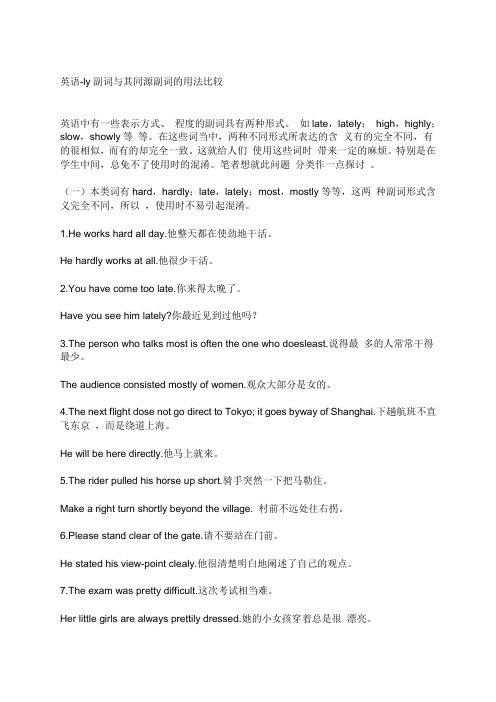
英语-ly副词与其同源副词的用法比较英语中有一些表示方式、程度的副词具有两种形式。
如late,lately;high,highly;slow,showly等等。
在这些词当中,两种不同形式所表达的含义有的完全不同,有的很相似,而有的却完全一致。
这就给人们使用这些词时带来一定的麻烦。
特别是在学生中间,总免不了使用时的混淆。
笔者想就此问题分类作一点探讨。
(一)本类词有hard,hardly;late,lately;most,mostly等等,这两种副词形式含义完全不同,所以,使用时不易引起混淆。
1.He works hard all day.他整天都在使劲地干活。
He hardly works at all.他很少干活。
2.You have come too late.你来得太晚了。
Have you see him lately?你最近见到过他吗?3.The person who talks most is often the one who doesleast.说得最多的人常常干得最少。
The audience consisted mostly of women.观众大部分是女的。
4.The next flight dose not go direct to Tokyo; it goes byway of Shanghai.下趟航班不直飞东京,而是绕道上海。
He will be here directly.他马上就来。
5.The rider pulled his horse up short.骑手突然一下把马勒住。
Make a right turn shortly beyond the village. 村前不远处往右拐。
6.Please stand clear of the gate.请不要站在门前。
He stated his view-point clealy.他很清楚明白地阐述了自己的观点。
7.The exam was pretty difficult.这次考试相当难。
英语语法基础知识点汇总:形容词和副词

英语语法基础知识点汇总:形容词和副词英语语法基础知识点汇总:形容词和副词•4. 形容词和副词4.1 形容词及其用法形容词修饰名词,说明事物或人的性质或特征。
通常,可将形容词分成性质形容词和叙述形容词两类,其位置不一定都放在名词前面。
1) 直接说明事物的性质或特征的形容词是性质形容词,它有级的变化,可以用程度副词修饰,在句中可作定语、表语和补语。
例如:hot 热的。
2) 叙述形容词只能作表语,所以又称为表语形容词。
这类形容词没有级的变化,也不可用程度副词修饰。
大多数以a开头的形容词都属于这一类。
例如:afraid 害怕的。
(错) He is an ill man.(对) The man is ill.(错) She is an afraid girl.(对) The girl is afraid.这类词还有:well,unwell,ill,faint,afraid,alike,alive,alone,asleep,awake 等。
3)形容词作定语修饰名词时,要放在名词的前边。
但是如果形容词修饰以-thing为字尾的词语时,要放在这些词之后,例如:something nice4.1 形容词及其用法形容词修饰名词,说明事物或人的性质或特征。
通常,可将形容词分成性质形容词和叙述形容词两类,其位置不一定都放在名词前面。
1) 直接说明事物的性质或特征的形容词是性质形容词,它有级的变化,可以用程度副词修饰,在句中可作定语、表语和补语。
例如:hot 热的。
2) 叙述形容词只能作表语,所以又称为表语形容词。
这类形容词没有级的变化,也不可用程度副词修饰。
大多数以a开头的形容词都属于这一类。
例如:afraid 害怕的。
(错) He is an ill man.(对) The man is ill.(错) She is an afraid girl.(对) The girl is afraid.这类词还有:well,unwell,ill,faint,afraid,alike,alive,alone,asleep,awake 等。
英语语法大全(精心整理)
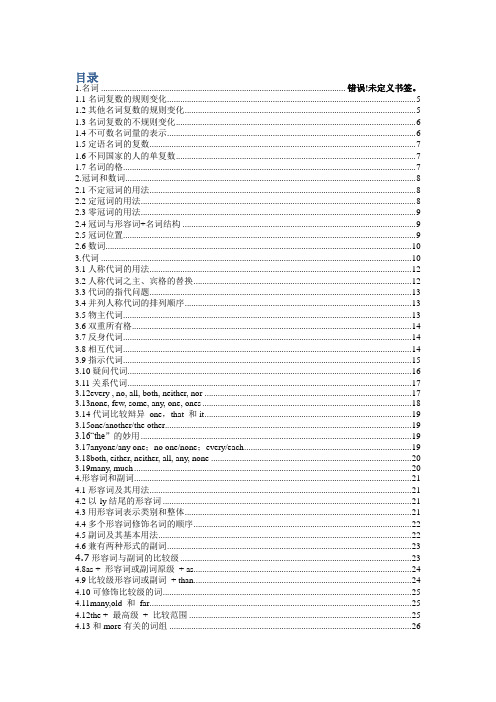
目录1.名词 ............................................................................................................... 错误!未定义书签。
1.1名词复数的规则变化 (5)1.2其他名词复数的规则变化 (5)1.3名词复数的不规则变化 (6)1.4不可数名词量的表示 (6)1.5定语名词的复数 (7)1.6不同国家的人的单复数 (7)1.7名词的格 (7)2.冠词和数词 (8)2.1不定冠词的用法 (8)2.2定冠词的用法 (8)2.3零冠词的用法 (9)2.4冠词与形容词+名词结构 (9)2.5冠词位置 (9)2.6数词 (10)3.代词 (10)3.1人称代词的用法 (12)3.2人称代词之主、宾格的替换 (12)3.3代词的指代问题 (13)3.4并列人称代词的排列顺序 (13)3.5物主代词 (13)3.6双重所有格 (14)3.7反身代词 (14)3.8相互代词 (14)3.9指示代词 (15)3.10疑问代词 (16)3.11关系代词 (17)3.12every , no, all, both, neither, nor (17)3.13none, few, some, any, one, ones (18)3.14代词比较辩异one,that 和it (19)3.15one/another/the other (19)3.16“the”的妙用 (19)3.17anyone/any one;no one/none;every/each (19)3.18both, either, neither, all, any, none (20)3.19many, much (20)4.形容词和副词 (21)4.1形容词及其用法 (21)4.2以-ly结尾的形容词 (21)4.3用形容词表示类别和整体 (21)4.4多个形容词修饰名词的顺序 (22)4.5副词及其基本用法 (22)4.6兼有两种形式的副词 (23)4.7形容词与副词的比较级 (23)4.8as + 形容词或副词原级+ as (24)4.9比较级形容词或副词+ than (24)4.10可修饰比较级的词 (25)4.11many,old 和far (25)4.12the + 最高级+ 比较范围 (25)4.13和more有关的词组 (26)5.1系动词 (27)5.2什么是助动词 (28)5.3助动词be的用法 (28)5.4助动词have的用法 (29)5.6助动词shall和will的用法 (30)5.7助动词should和would的用法 (30)5.8短语动词 (30)6.动名词 (31)6.1动名词作主语、宾语和表语 (31)7动词不定式 (32)7.1不定式作宾语 (32)7.2不定式作补语 (32)7.3不定式主语 (33)7.4It's for sb.和It's of sb. (34)7.5不定式作表语 (34)7.6不定式作定语 (34)7.7不定式作状语 (34)7.8用作介词的to (34)7.9省to 的动词不定式 (35)7.10动词不定式的否定式 (35)7.11不定式的特殊句型too...to (36)7.13不定式的特殊句型Why not (36)8.特殊词精讲 (37)8.1stop doing/to do (37)8.2forget doing/to do (37)8.3remember doing/to do (37)8.4regret doing/to do (37)8.6try doing/to do (38)8.7go on doing/to do (38)8.8be afraid doing/to do (38)8.9be interested doing/to do (38)8.10mean to doing/to do (39)8.11begin (start)doing/to do (39)8.12感官动词+ doing/to do (39)9.分词 (39)9.1分词作定语 (39)9.4分词作补语 (41)9.5分词作表语 (41)9.6分词作插入语 (41)9.7分词的时态 (41)10.独立主格 (42)10.1独立主格 (42)10.2With的复合结构 (42)11.动词的时态 (43)11.1一般现在时的用法 (43)11.3used to / be used to (44)11.4一般将来时 (44)11.5be going to / will (45)11.6be to和be going to (45)11.7一般现在时表将来 (45)11.8用现在进行时表示将来 (45)11.11用于现在完成时的句型 (46)11.12比较since和for (47)11.14延续动词与瞬间动词 (47)11.17将来完成时 (48)11.26一般现在时代替进行时 (50)11.27现在进行时代替将来时 (51)11.28时态一致 (51)1.29时态与时间状语 (51)12.动词的语态 (51)12.1Let的用法 (51)12.2短语动词的被动语态 (52)12.3表示"据说"或"相信" 的词组 (52)13.句子的种类 (53)13.1句子的种类 (54)13.4用助动词进行强调 (56)14.倒装 (58)14.1倒装句之全部倒装 (58)14.2倒装句之部分倒装 (58)14.4so, neither, nor作部分倒装 (59)14.5only在句首要倒装的情况 (59)14.6as, though 引导的倒装句 (59)14.7其他部分倒装 (60)15.主谓一致 (60)15.1并列结构作主语谓语用复数 (60)15.6与后接名词或代词保持一致 (61)16.虚拟语气 (61)16.1真是条件句 (62)16.2非真实条件句 (62)16.4虚拟条件句的倒装 (63)16.7比较if only与only if (64)16.8It is (high) time that (64)17.名词性从句 (64)17.1引导名词性从句的连接词 (65)17.2名词性that-从句 (65)17.3名词性wh-从句 (66)18.定语从句 (67)18.1关系代词引导的定语从句 (67)18.2关系副词引导的定语从句 (68)18.9关系代词that 的用法 (70)19.状语从句 (70)19.1地点状语从句 (70)19.2方式状语从句 (70)19.3原因状语从句 (71)19.4目的状语从句 (71)19.5结果状语从句 (71)19.6条件状语从句 (72)19.7让步状语从句 (72)19.8比较while, when, as (73)19.9比较until和till (73)19.10表示"一...就..."的结构 . (73)20.1并列连词与并列结构 (74)20.2比较and和or (74)20.3表示选择的并列结构 (75)20.4表示转折或对比 (75)20.5表原因关系 (75)20.6比较so和such (76)21.情态动词 (76)21.1情态动词的语法特征 (76)21.3比较may和might (76)21.4比较have to和must (77)21.5must表示推测 (77)21.6表示推测的用法 (77)21.7情态动词+ have +过去分词 (78)21.8should 和ought to (78)21.9had better表示"最好" (78)21.10would rather表示"宁愿" (79)21.14比较need和dare (80)22介词 (80)22.1介词的句法功能 (80)22.2主要介词区别 (80)1.名词名词可以分为专有名词(Proper Nouns)和普通名词(Common Nouns),专有名词是某个(些)人,地方,机构等专有的名称,如Beijing,China等。
类似 high 与 highly 的词语区别
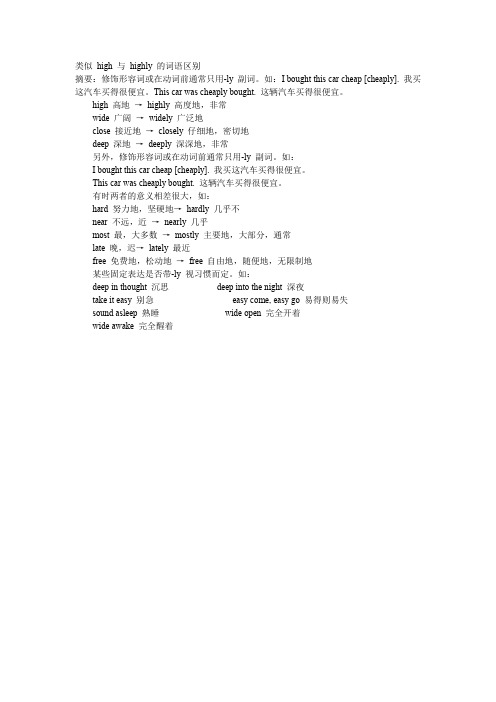
类似high 与highly 的词语区别
摘要:修饰形容词或在动词前通常只用-ly 副词。
如:I bought this car cheap [cheaply]. 我买这汽车买得很便宜。
This car was cheaply bought. 这辆汽车买得很便宜。
high 高地→highly 高度地,非常
wide 广阔→widely 广泛地
close 接近地→closely 仔细地,密切地
deep 深地→deeply 深深地,非常
另外,修饰形容词或在动词前通常只用-ly 副词。
如:
I bought this car cheap [cheaply]. 我买这汽车买得很便宜。
This car was cheaply bought. 这辆汽车买得很便宜。
有时两者的意义相差很大,如:
hard 努力地,坚硬地→hardly 几乎不
near 不远,近→nearly 几乎
most 最,大多数→mostly 主要地,大部分,通常
late 晚,迟→lately 最近
free 免费地,松动地→free 自由地,随便地,无限制地
某些固定表达是否带-ly 视习惯而定。
如:
deep in thought 沉思deep into the night 深夜
take it easy 别急easy come, easy go 易得则易失
sound asleep 熟睡wide open 完全开着
wide awake 完全醒着。
2024年中考英语专题复习精练—副词辨析1

2024年中考英语专题复习精练—副词辨析1易混副词辨析英语中一些词加不加ly都是副词,但是意义差别很大。
1、hard艰难地;hardly几乎没有►They work very hard.他们工作非常努力。
►I hardly know her. 我不怎么认识她.例:Tom studies ________, so he ________ fails the exam.A. hardly; hardlyB. hard; hardlyC. hard; hardD. hardly; hard在英文中,应该注意hard和hardly的区别,hard可以作形容词或副词,意为"努力",也可以指雨大或雪大,而hardly是副词,意为"几乎不"。
在实际使用时,应注意它们的区别。
2、late迟到;lately最近►You have come too late. 你来得太晚了。
►Have you see him lately? 你最近见到过他吗?3、pretty=very非常;prettily漂亮地►The exam was pretty difficult.这次考试相当难。
►The little girl is always prettily dressed.这个小女孩总是穿得漂漂亮亮的。
意思区别相近的,分别表示具体跟抽象的意思:4、close(具体距离上的)接近地、紧挨地;closely(抽象)亲密地►They sat close together►Who is closely to you, your mom or your dad?例:—China has formed a deep friendship with countries around the world.—That’s true. We are working ______ together in many fields.A. closelyB. nervouslyC. terriblyD. humorously5、high(具体高度)高地;highly(抽象)高度地,赞赏地►The kites fly high in the sky. 这些风筝在天空飞得很高。
中小学英语常考词汇:deep和deeply等同源副词有何区别?
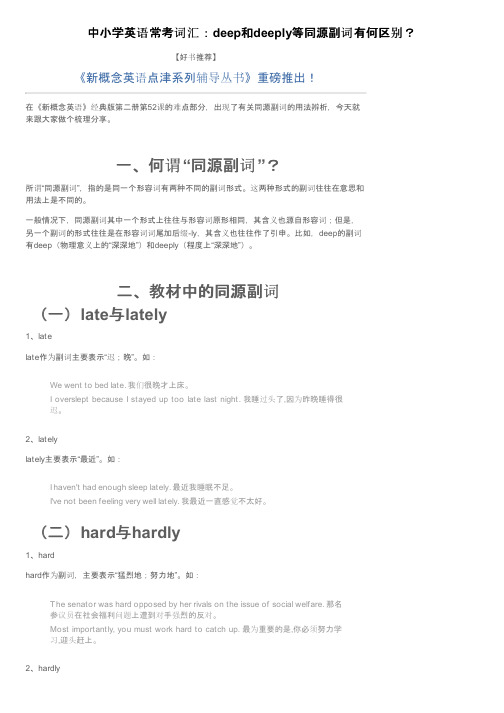
中小学英语常考词汇:deep和deeply等同源副词有何区别?【好书推荐】《新概念英语点津系列辅导丛书》重磅推出!在《新概念英语》经典版第二册第52课的难点部分,出现了有关同源副词的用法辨析,今天就来跟大家做个梳理分享。
一、何谓“同源副词”?所谓“同源副词”,指的是同一个形容词有两种不同的副词形式。
这两种形式的副词往往在意思和用法上是不同的。
一般情况下,同源副词其中一个形式上往往与形容词原形相同,其含义也源自形容词;但是,另一个副词的形式往往是在形容词词尾加后缀-ly,其含义也往往作了引申。
比如,deep的副词有deep(物理意义上的“深深地”)和deeply(程度上“深深地”)。
二、教材中的同源副词(一)late与lately1、latelate作为副词主要表示“迟;晚”。
如:We went to bed late. 我们很晚才上床。
I overslept because I stayed up too late last night. 我睡过头了,因为昨晚睡得很迟。
2、latelylately主要表示“最近”。
如:I haven't had enough sleep lately. 最近我睡眠不足。
I've not been feeling very well lately. 我最近一直感觉不太好。
(二)hard与hardly1、hardhard作为副词,主要表示“猛烈地;努力地”。
如:T he senator was hard opposed by her rivals on the issue of social welfare. 那名参议员在社会福利问题上遭到对手强烈的反对。
Most importantly, you must work hard to catch up. 最为重要的是,你必须努力学习,迎头赶上。
2、hardlyhardly在意思上与形容词hard已经没有什么关联了,主要表示“几乎不;简直不”。
英语形容词和副词的用法讲解

film.
Foreign Language Department COCO
4) high与highly high表示空间高度;highly表示程度,相当于
4.4 多个形容词修饰名词的顺序
Foreign Language Department COCO
多个形容词修饰名词时,其顺序为:
限定词--数词--描绘词--(大小,长短,形 状,新旧,颜色) --出处--材料性质,类 别--名词
a small round table a tall gray building a dirty old brown shirt a famous German medical school an expensive Japanese sports car
4.3 用形容词表示类别和整体
1) 某些形容词加上定冠词可以泛指一类人,与 谓语动词的复数连接。如:the dead,the living,the rich,the poor,the blind,the hungry
The poor are losing hope. Foreign Language Department COCO
放在as的前面。 a.This room is twice as big as that one. b.Your room is the same size as mine.
Foreign Language Department COCO
Foreign Language Department COCO
短文改错中常见近义词的考查
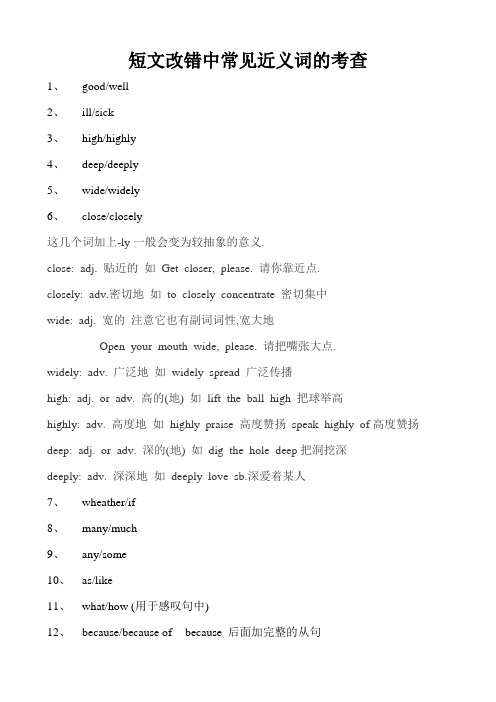
短文改错中常见近义词的考查1、good/well2、ill/sick3、high/highly4、deep/deeply5、wide/widely6、close/closely这几个词加上-ly一般会变为较抽象的意义.close: adj. 贴近的如Get closer, please. 请你靠近点.closely: adv.密切地如to closely concentrate 密切集中wide: adj. 宽的注意它也有副词词性,宽大地Open your mouth wide, please. 请把嘴张大点.widely: adv. 广泛地如widely spread 广泛传播high: adj. or adv. 高的(地) 如lift the ball high 把球举高highly: adv. 高度地如highly praise 高度赞扬speak highly of高度赞扬deep: adj. or adv. 深的(地) 如dig the hole deep把洞挖深deeply: adv. 深深地如deeply love sb.深爱着某人7、wheather/if8、many/much9、any/some10、as/like11、what/how (用于感叹句中)12、because/because of because 后面加完整的从句because of 加名词,动名词Because it is raining outside,I can not go out right now.Because of the rain,I can not go out right now.13、in case/ in case of in case 后接从句:以防万一;万一In case that it rains, you'd better take an umbrella.以防下雨,你最好带上一把雨伞。
情感递进的词汇英语翻译

情感递进的词汇英语翻译在英语中,表达情感递进的词汇有很多,这些词汇可以帮助我们更准确地描述情感的强度和变化。
以下是一些常用于表达情感递进的英语词汇,按照情感强度从弱到强的顺序排列:1. Slightly - 轻微地- E.g., I am slightly interested in the topic.2. Mildly - 温和地- E.g., She was mildly upset by the news.3. Moderately - 中等地- E.g., He is moderately happy with the results.4. Fairly - 相当地- E.g., I am fairly confident about my ability to complete the task.5. Quite - 相当,颇- E.g., I am quite pleased with the outcome.6. Very - 非常- E.g., She is very angry about the delay.7. Extremely - 极其- E.g., He is extremely delighted with the gift.8. Highly - 高度地- E.g., The situation is highly emotional.9. Deeply - 深刻地- E.g., The movie was deeply moving.10. Profoundly - 深远地- E.g., The experience profoundly affected her.11. Intensely - 强烈地- E.g., He is intensely devoted to his work.12. Passionately - 热情地- E.g., She passionately believes in the cause.13. Overwhelmingly - 压倒性地- E.g., The evidence was overwhelmingly in favor.14. Terribly - 非常,可怕地- E.g., I am terribly sorry for the mistake.15. Utterly - 完全地- E.g., He is utterly exhausted after the long journey.使用这些词汇时,可以根据情感的强弱和上下文的需要来选择最合适的表达。
(最新整理)五个常见英语否定前缀用法辨析
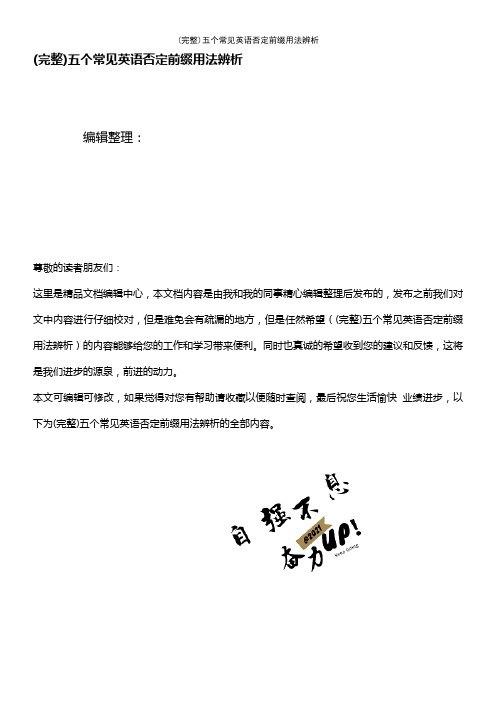
(完整)五个常见英语否定前缀用法辨析编辑整理:尊敬的读者朋友们:这里是精品文档编辑中心,本文档内容是由我和我的同事精心编辑整理后发布的,发布之前我们对文中内容进行仔细校对,但是难免会有疏漏的地方,但是任然希望((完整)五个常见英语否定前缀用法辨析)的内容能够给您的工作和学习带来便利。
同时也真诚的希望收到您的建议和反馈,这将是我们进步的源泉,前进的动力。
本文可编辑可修改,如果觉得对您有帮助请收藏以便随时查阅,最后祝您生活愉快业绩进步,以下为(完整)五个常见英语否定前缀用法辨析的全部内容。
五个常见英语否定前缀用法辨析一、un-是来自英语本族语的前缀,其英文含义为not,the opposite of。
它是5个否定前缀中运用最为广泛的一个,构词能力相当强.通常加在形容词、副词、名词、动词及分词之前,表示否定意义和相反的动作。
该词缀的用法有下列几种情形:1。
un-加在词头为in-或im-的单词前。
a。
加在in-前:uninfluential uninformative unintelligent unintenti onal unintelliglble uninterpretable uninteresting unin volved b。
加在im-前:unimportant unimaginable unimpressible unimpressive unimproved unimagined2. un-加在以-able,—ful,—like,—ly,—some,-ing,-ed结尾的单词前。
a。
加在—able结尾的词前:unfinishable undesirable unmatchable unexplainable unexpectable unt ranslatableb。
加在—ful结尾的词前:unhealthful unfruitful unhelpful unmindful unpainful unskillful unsucceessful unusefulc。
英语-ly副词与其同源副词的用法比较-high-highly-close-closely-deep-deeply-wide-widely

英语-ly副词与其同源副词的用法比较英语中有一些表示方式、程度的副词具有两种形式。
如late,lately;high,highly;slow,showly等等。
在这些词当中,两种不同形式所表达的含义有的完全不同,有的很相似,而有的却完全一致。
这就给人们使用这些词时带来一定的麻烦。
特别是在学生中间,总免不了使用时的混淆。
笔者想就此问题分类作一点探讨。
(一)本类词有hard,hardly;late,lately;most,mostly等等,这两种副词形式含义完全不同,所以,使用时不易引起混淆。
1.He works hard all day.他整天都在使劲地干活。
He hardly works at all.他很少干活。
2.You have come too late.你来得太晚了。
Have you see him lately?你最近见到过他吗?3.The person who talks most is often the one who doesleast.说得最多的人常常干得最少。
The audience consisted mostly of women.观众大部分是女的。
4.The next flight dose not go direct to Tokyo; it goes byway of Shanghai.下趟航班不直飞东京,而是绕道上海。
He will be here directly.他马上就来。
5.The rider pulled his horse up short.骑手突然一下把马勒住。
Make a right turn shortly beyond the village. 村前不远处往右拐。
6.Please stand clear of the gate.请不要站在门前。
He stated his view-point clealy.他很清楚明白地阐述了自己的观点。
7.The exam was pretty difficult.这次考试相当难。
英语语法 常见固定搭配

英语语法讲解1.名词1.1 名词复数的规则变化(1)一般情况加s,清辅音读/s/,浊辅音和元音读/z/(2)以s、sh、ch和x结尾的,加es,读/iz/(3)以ce、se、ze、ge等结尾的,加s,读/iz/(4)以辅音字母+y结尾的,变y为i再加es,读/z/(5)以y结尾的专有名词或元音字母+y结尾的,直接加sStory--stories;storey--storeys(6)以o结尾的词,1)加es:黑人英雄喜欢吃土豆和西红柿negro、hero、potato、tomato2)加s:除上述特殊的3)加s/es:zero--zeros/zeroes(7)以f或fe结尾的词,1)变f / fe为v再加es:leaf--leaves;wolf-wolves;wife-wives;life--lives;knife--knives;thief--thieves2)加s:belief--beliefs;roof--roofs;gulf--gulfs;safe--safes3)加s or 变ves:handkerchief--handkerchiefs/handkerchieves1.2 名词复数的不规则变化(1)mouse--mice;man--men;woman--womenGerman--Germans(非合成词)Englishman--Englishmen(2)单复数同形deer、sheep、fishChinese、Japaneseli、jin、yuan、mu除人民币元、角、分外,美元dollar、英镑、法郎均有复数形式(3)集体名词,单数形式表复数含义people、police、cattle(a head of cattle)the Chinese、the British、the French等表示国民总称时(4)以s结尾,但为单数的名词1)maths、politics、physics等学科名词,为不可数名词2)news3)the United States、the United Nations 专有名词4)书名、报纸名、杂志名、剧名等也视为单数(5)表示成双成对出现的,如glasses、clothes、trousers等,借助于量词pair、suit等表达具体数目(6)其他如东西goods货物、waters水域;fishes鱼1.3 不可数名词(1)物质名词1)物质名词转为个体名词Cake is a kind of food. 蛋糕是一种食物。
少儿英语语法:两种形式的副词
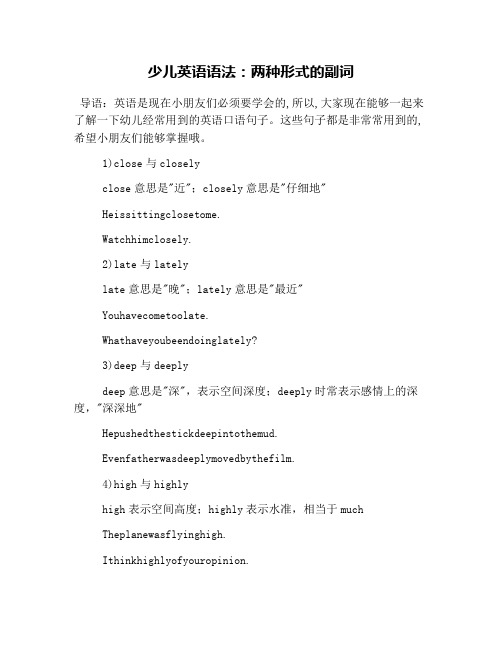
少儿英语语法:两种形式的副词导语:英语是现在小朋友们必须要学会的,所以,大家现在能够一起来了解一下幼儿经常用到的英语口语句子。
这些句子都是非常常用到的,希望小朋友们能够掌握哦。
1)close与closelyclose意思是"近";closely意思是"仔细地"Heissittingclosetome.Watchhimclosely.2)late与latelylate意思是"晚";lately意思是"最近"Youhavecometoolate.Whathaveyoubeendoinglately?3)deep与deeplydeep意思是"深",表示空间深度;deeply时常表示感情上的深度,"深深地"Hepushedthestickdeepintothemud.Evenfatherwasdeeplymovedbythefilm.4)high与highlyhigh表示空间高度;highly表示水准,相当于muchTheplanewasflyinghigh.Ithinkhighlyofyouropinion.5)wide与widelywide表示空间宽度;widely意思是"广泛地","在很多地方" Heopenedthedoorwide.Englishiswidelyusedintheworld.6)free与freelyfree的意思是"免费";freely的意思是"无限制地" Youcaneatfreeinmyrestaurantwheneveryoulike. Youmayspeakfreely;saywhatyoulike.。
第二篇high,highly deep,deeply close,closely的区别第二篇语言点

high,highly 的区别
பைடு நூலகம்
deep,deeply
close,closely
deep和deeply deep in thought/conversation/into the night “深思/深入交谈/深夜” [固定短语] They had a talk deep into the night. Mr. John was seated in the armchair, deep in thought. 1) Tom and Rose aredeeply _____(deep) in love with each other. 2) We were deep/deeply moved by his touching √ story. 3) The workers dug a very deep/deeply well into √ the ground.
close “靠近的;接近的(距离上的“近”) 和closely “密切地;仔细地”
1. The church is close/closely to our school. √ 2.The bou was standing close/closely to his √ father. 3. These newly-born babies are close/closely √ looked after by the nurses. 4. Hi, guys, please watch the procedures close/closely ,don't miss any details. √
workersdugverydeepdeeplywellgrounddeepnight深思深入交谈深夜固定短语deep和deeplydeeplyclose靠近的
close和closely_deep和deeply_high和highly的区别

closely. ▲ The scientists got closely in touch with the
astronauts
see it close to. • closely是指一种抽象的“近”也可引申为“亲密
;仔细”等意思。 • 如:你的句子中watch closely the short man(
仔细看看那个矮个男人)
high和highly
• .这里的“高”就是具体的,所以来自high; • The kites fly high in the sky. • highly是抽象的,引申为“很;高级地,大量地;
钦佩地,赞赏地”等意思, • 如:His teachers think very highly of him.(老师们
很欣赏他。)
deep和deeply
• deep与deeply • deep意思是"深",表示空间深度; • deeply时常表示感情上的深度,"深深地" • He pushed the stick deep into the mud. • Even father was deeply moved by the film.
eg: Dr Kelly walked _____ to the window to watch _____ the short man shopping on the street. A.close;closely B. closely;close
C.close;close D.closely;closely ▲I went closer, and saw clearly a tall man in the moonlight. ▲ Come close, I want to tell you something
高中英语“-ly”结尾副词一览74个
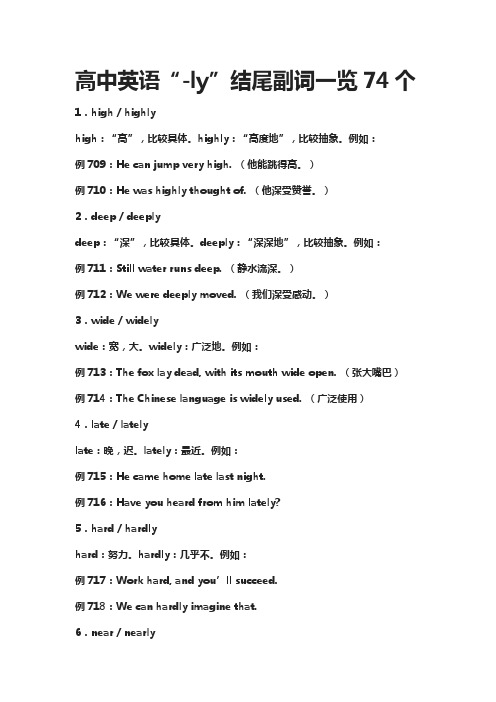
高中英语“-ly”结尾副词一览74个1.high / highlyhigh:“高”,比较具体。
highly:“高度地”,比较抽象。
例如:例709:He can jump very high. (他能跳得高。
)例710:He was highly thought of. (他深受赞誉。
)2.deep / deeplydeep:“深”,比较具体。
deeply:“深深地”,比较抽象。
例如:例711:Still water runs deep. (静水流深。
)例712:We were deeply moved. (我们深受感动。
)3.wide / widelywide:宽,大。
widely:广泛地。
例如:例713:The fox lay dead, with its mouth wide open. (张大嘴巴)例714:The Chinese language is widely used. (广泛使用)4.late / latelylate:晚,迟。
lately:最近。
例如:例715:He came home late last night.例716:Have you heard from him lately?5.hard / hardlyhard:努力。
hardly:几乎不。
例如:例717:Work hard, and you’ll succeed.例718:We can hardly imagine that.6.near / nearlynear:在附近。
nearly:几乎。
例如:例719:I live near.(我住在附近。
)例720:Nearly 1,000 people were trapped in the fire. (将近有一千人被困大火中。
)7.close / closelyclose:靠近。
closely:紧紧地,密切地。
例如:例721:Come close to me. (请靠近我。
- 1、下载文档前请自行甄别文档内容的完整性,平台不提供额外的编辑、内容补充、找答案等附加服务。
- 2、"仅部分预览"的文档,不可在线预览部分如存在完整性等问题,可反馈申请退款(可完整预览的文档不适用该条件!)。
- 3、如文档侵犯您的权益,请联系客服反馈,我们会尽快为您处理(人工客服工作时间:9:00-18:30)。
high与highly的区 别:
Байду номын сангаас
1.两者均可表示“高”,但high通常 表示具体的高,且主要修饰动词; He climbed high. 他爬得很高。 Do you see that butterfly flying high above the street? 2. highly 主要表示很高的程度(意为 “高度地”、“非常地”),修饰动词 (如 speak, praise, think of等), He speaks very highly of you. They thought very highly of him. 。
deep与deeply的 用法区别
1、两者均可表示“深”、“深深地”, 修饰具体的动作, 有时可互换: The doctor asked me to breathe deep [deeply]. 2、修饰静止状态、介词短语或表示深 夜等,通常用deep(偶尔也用deeply): He sat there deep in thought. 深思。 The meeting continued deep into the night. Karen and Dave are deeply in love with each other.
(4 ) closely adv. 紧密地;仔细地; 密切地(表抽象意义) He got closely in touch with the magazines of today. The little baby was closely looked after by her.
类似的词组有 wide (很开,宽) -- widely (广泛地),low (低的)-- lowly (低贱的) (作 形容词) , near—nearly He opened his mouth wide. English is widely used in the world. The bird is now flying quite low. He bowed lowly before the queen.谦恭地 Visitors came from near and far. The exams are drawing near. They are nearly always late.
【注意】 • hard adv. 努力地 • hardly adv. 几乎不(否定) • He works hard at his lessons. • He hardly works at his lessons.
3. highly还通常用于修饰分词或形容词(尤 其是那些由动词派生而来的形容词, 有时 相当于 very much)。如: She is a highly educated woman. The Chinese are a highly civilized people. 中国人是有高度文明的人。 It was highly confidential. 高度机密 It's highly likely that he will succeed. The industry of France was not yet highly developed. 尚未高度发展。 【注】在用连字符构成的复合形容词中, 通常要用 high。如:high-priced 高价的
3、修饰带有感情色彩的动词(如 hate, dislike, love, admire, hurt, regret 等), 通常要用 deeply,另外,修饰形容词、 过去分词等,一般也要用deeply: He deeply hates fish. 很不喜欢吃鱼。 We deeply regret your misfortune. I am deeply grateful to you. 我衷心 感谢你。 He was deeply moved by [at] the story. 听了这个故事,他深受感动。
Close与Closely 的用法区别
(1)close adj. 靠近;接近;亲密;密切 短语:get /be close to 靠近;亲近 The church is close to the shops. Are you a close friend of theirs? (2) close adv. 靠近;接近 (表具体意义) hike / walk / run / sit / stand close to... He was standing close to the door. (3) close v. 关上;关闭(不开发);结束 She closed her eyes. / Her eyes closed. (闭上)
